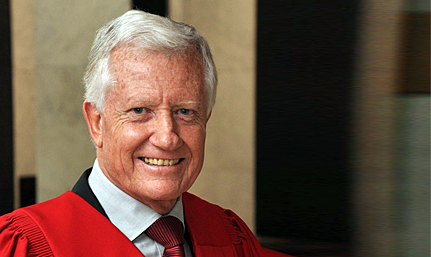 |
4 October 2013
Photo: Stephen Collett |
“This is a university that gives me hope. It has a willingness and a capacity to care,” Brand Pretorius said at a farewell function at the UFS.
He served the university as honorary professor in the Department of Business Management since 1991 and delivered the Brand Pretorius lecture for the past two decades. His recent lecture dealt with the topic “Guidelines for sustainable personal success in business – lessons I learnt”.
He retired as CEO of McCarthy and as an executive director of the Bidvest Group on 1 March 2011. Currently he serves as a non-executive director on the boards of the Barclays Africa Group, Reunert, RGT Smart, Tata Africa Holdings and Tongaat Hulett. He is the non-executive chairman of Italtile Limited.
Pretorius said at the farewell function the UFS is still a source of inspiration and pride. The leadership has a lot of courage and commitment and embraced change. “They embraced the fact that we are living in a different world.
“The vision of the UFS is inspirational. It wants to be recognised for academic and research excellence. The university became a pioneer in reconciliation in a very difficult world. Change comes with pain, and the UFS dealt with it in a worthy manner.
“I am proud of this institution because it still strives for high standards, the right principles and values and it has respect for all people.”
Pretorius said the university’s heart is in the right place. “It is a beacon of hope of what the rainbow nation will be in South Africa one day. Reconciliation is a sign that this is happening.”